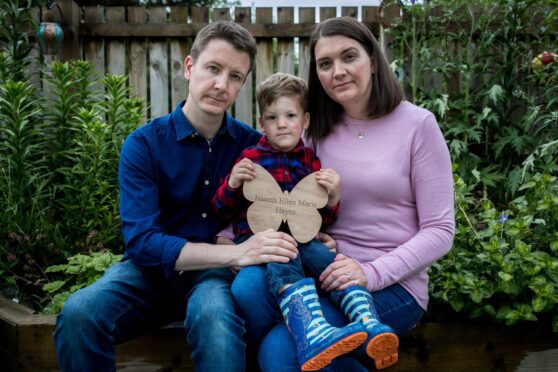
Hospital middle-managers are holding back funding for a life-saving pregnancy test because they fail to see the savings in both lives and overall costs to the NHS, a medical testing expert has revealed.
They are using budget formulas that are based on “value for money” to individual departments instead of the savings across the whole the NHS and the care it gives.
The insider lifts the lid on the delay in testing pregnant mothers for a dangerous illness called pre-eclampsia – affecting 8% of them.
Last month the Sunday Post revealed no Scottish health board routinely offered the PlGF test to those at risk, despite it being approved by the Scottish Health Technologies Group 15 months ago.
The test is available in England and is being rolled out in Wales.
The expert said: “Essentially, in Scotland, each health board puts forward a business case to their finance team, which decides funding. This team assesses the value for money to the immediate department/patient care involved in giving the test.
“So, they could consider the value for money for maternity care but not the follow-on paediatric care for the baby if it is born with disabilities caused by its mother not having her pre-eclampsia diagnosed in time.
“The cost of life-long complications of prematurity, or the mother’s cardiovascular or other medical complications triggered by not controlling pre-eclampsia timeously are also not considered.”
Value in lives saved
The expert said NHS England was rolling out the test because it saw the value in lives saved and the savings for longer-term care.
The mechanics of setting up testing in Scottish health board laboratories require each health board to integrate the PlGF test into its current diagnostic systems.
The insider said: “Pathology teams in Scottish health boards are under huge pressure and unable to fund PlGF testing within their budget. It desperately needs additional funding from the Scottish Government or public money from elsewhere to carry out the testing.”
PlGF was first implemented in England in 2017 and by 2021 NHS England declared it was officially available to mums.
One mum has called for the test to be made available. Laura Quinn, from North Lanarkshire, became dangerously ill and her daughter Freya suffered a heart attack in the womb because pre-eclampsia went undiagnosed. Neurosurgeons also had to relieve pressure on her brain. Freya had to be delivered almost four months early to save mother and baby and both fought to survive in intensive care.
“Our wonderful Freya survived serious prematurity and major heart surgeries,” said Laura,39. “We were told she is likely to have had a heart attack in the womb. I did not have the classic pre-eclampsia symptom of high blood pressure so the PlGF test would have detected it. I don’t want any other mothers or babies to experience this if it can be avoided.”
Potentially life-saving test
Last month, freedom of information requests by Action on Pre-eclampsia (Apec) revealed no Scottish health board offered it routinely. CEO Marcus Green said: “The savings to mothers, babies and the NHS are considerable when they have access to the PlGF test.”.
Dundee-born Emeritus Professor James Walker, a UK leading expert in pre-eclampsia and maternal safety, said: “Not only is it a potential lifesaver, but it saves NHS money in ICU and other treatment. Early detection gives us several hours’ notice, allowing doctors to give mothers steroids to mature their babies’ lungs in preparation for a premature delivery.”
First Minister John Swinney promised to meet Apec along with MSPs Tess White and Monica Lennon and campaigners to discuss their concerns. White, the Conservative women’s health spokeswoman, recently questioned the serious delay in the Scottish Parliament. She became dangerously ill with pre-eclampsia while pregnant with her son, James.
The Scottish Government said: “We are initiating a new scoping exercise to further understand the current position in relation to using the PIGF test, and to inform what further support may be necessary to advance implementation plans.”
I don’t want anyone to experience the heartbreak of losing a child as I did. The test must be available to all
A mother who lost her baby two days before she was born is urging the Scottish Government to introduce the lifesaving pregnancy test which diagnoses serious illnesses early.
Mhairi Hayes’ daughter Niamh passed away in the womb as she sought medical and midwifery help because she was in pain.
Bank worker Mhairi, 39, from West Lothian, reported swollen hands and feet and severe back pain to her midwife and GP but they were mistaken for being in the range of normal pregnancy symptoms.
She was suffering from pre-eclampsia and believes that if she had access to the test called PlGF her baby daughter would have been delivered and may have survived. At that point in 2020 it was being rolled out in hospitals in England but not Scotland.
“I felt ill for three weeks but my symptoms were dismissed as sleep apnea and heartburn and I was signed off work. I was very unwell and knew there was something seriously wrong because my baby had slowed down moving about in my womb, she explained.
“The signs were not picked up and my husband and I decided we should go to hospital when I developed a spot in my eye and had been bleeding that day
“I was 27 weeks pregnant and was assured that the bleeding was nothing to worry about but that the hospital was more than happy to see us. It was then that we discovered Niamh had died days before and that I had Hellp syndrome and was very unwell.”

Hellp (Hemolysis, elevated liver enzymes and low platelets) is a rare liver and blood clotting disorder, which affects mums with serious pre-eclampsia.
“The PlGF test for pre-eclampsia must be made available to mums as soon as possible. I never want anyone to experience what I did because it is heartbreaking,” she added.
Mhairi and husband Lee, a teacher, were allowed to stay with their newborn daughter for four days afterwards to say goodbye.
“It breaks my heart that other mothers risk going through this and it is beyond me, and I expect many other women, why there is a delay when the risk to life is recognised by doctors.
“It poses the question of whether women’s health is seriously neglected and this must be addressed.”
The couple went on to have another baby, Jack, now three, who they positively adore.
“I received much better care while I was pregnant with Jack, most probably because we had lost Niamh. There will always be the question of whether she would have survived if the PlGF test was available.”
Lee said: “The feeling of worry and helplessness is immense when your wife and baby are seriously ill. Losing Niamh has broken our hearts and we don’t want this to happen to any other family.”

Enjoy the convenience of having The Sunday Post delivered as a digital ePaper straight to your smartphone, tablet or computer.
Subscribe for only £5.49 a month and enjoy all the benefits of the printed paper as a digital replica.
Subscribe © Andrew Cawley
© Andrew Cawley